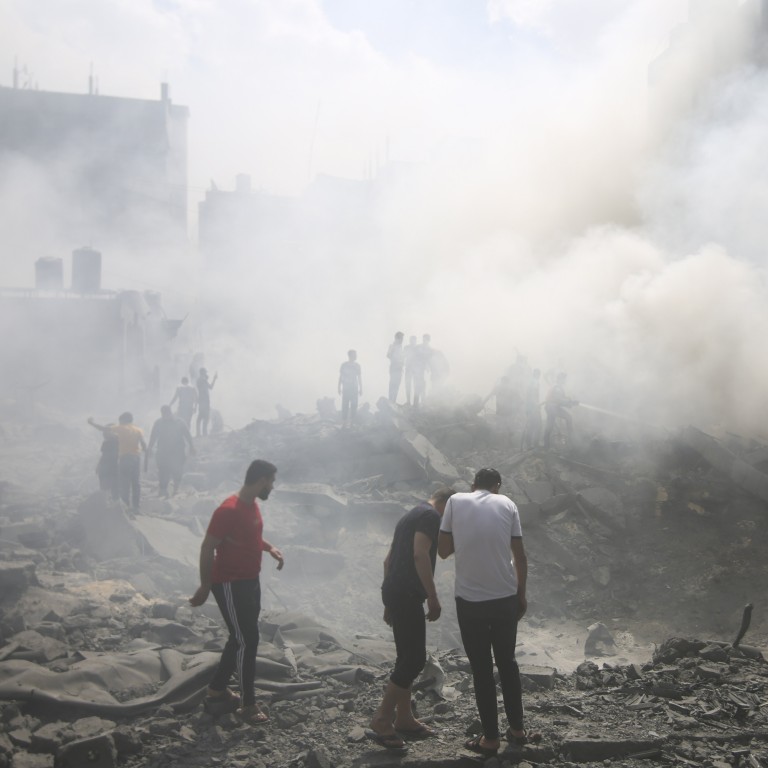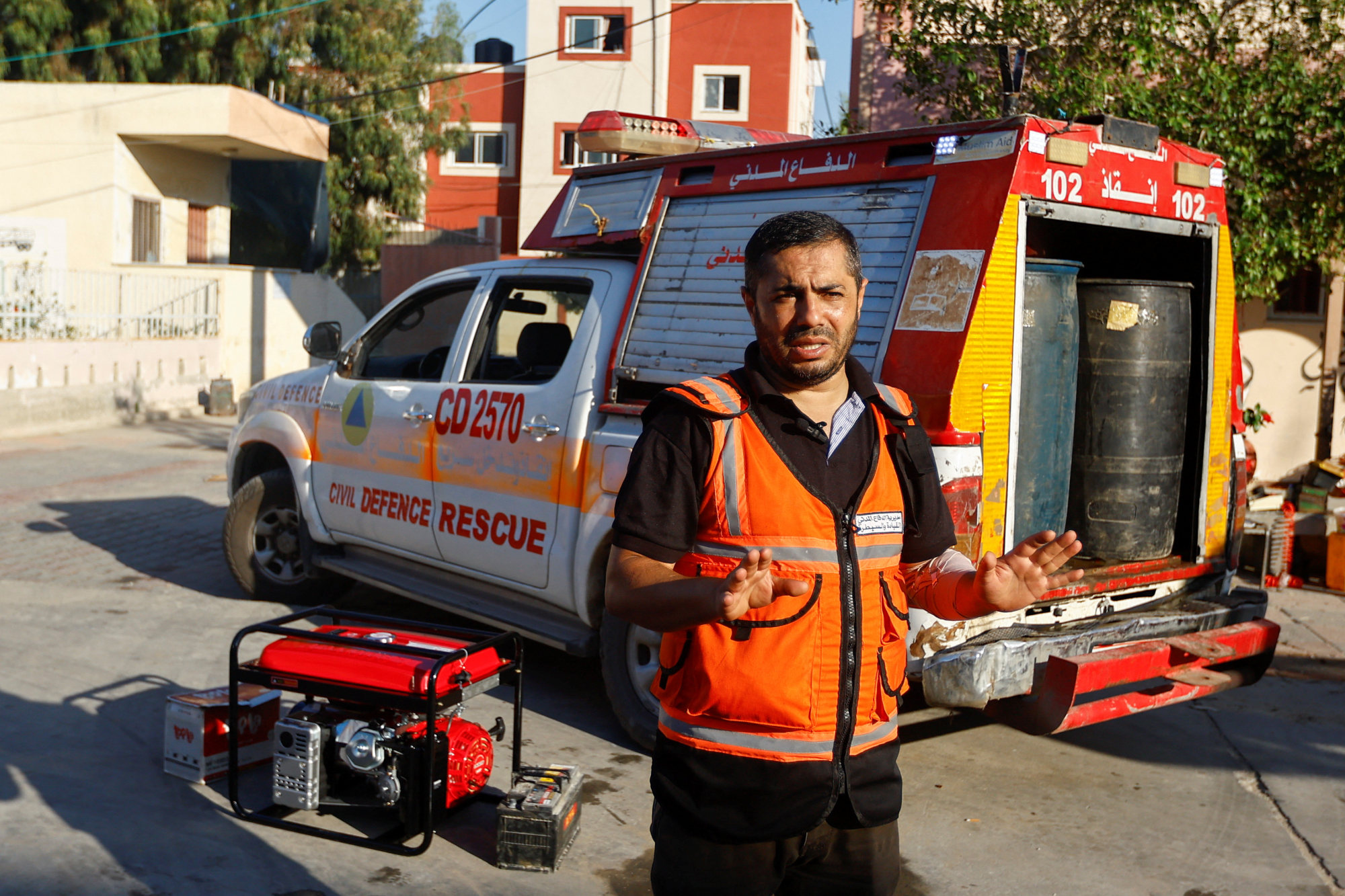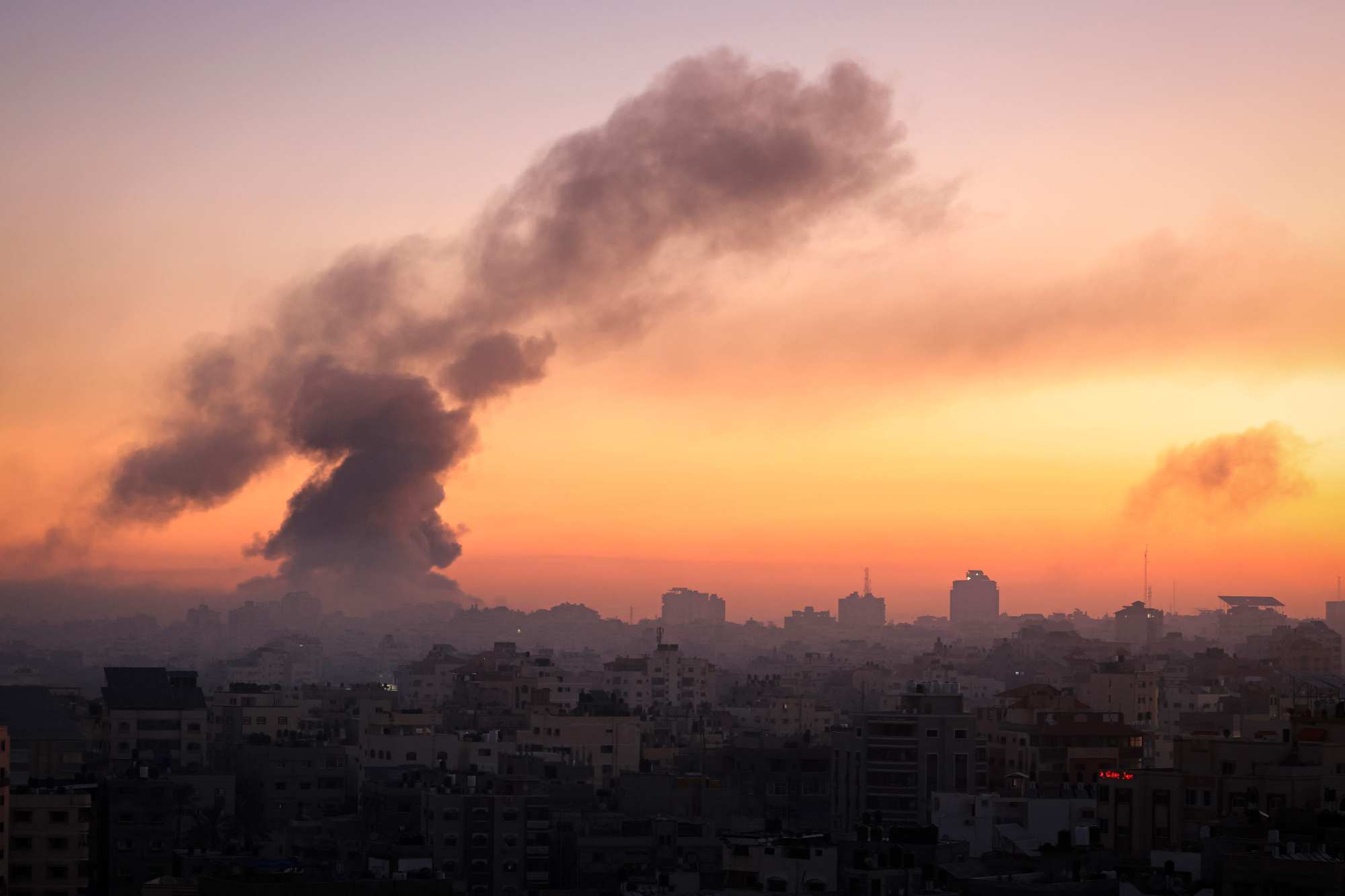
Gaza rescuers scared and exhausted under Israel’s air strikes
- Israel’s military has pounded Gaza following attack last weekend by Hamas insurgents
- Teams on duty round the clock; cratered roads, rubble and lack of kit hinder rescues
Palestinian rescuer Ibrahim Hamdan has been on duty almost constantly since Saturday, dodging Israeli air strikes that have killed paramedics even as his team tries to pull survivors from houses destroyed by the relentless pounding of the tiny enclave.
Israel’s bombardment of Gaza began on Saturday soon after the armed wing of the militant Islamist group Hamas governing the enclave smashed through barriers to send hundreds of fighters marauding through Israeli towns, killing 1,300 soldiers and civilians including children, Israel’s military says.
The bombardment is the most intense Israel has ever directed at Gaza, which is only 40km (25 miles) long and home to 2.3 million people living in cramped cities and refugee camps with few designated shelters and nowhere else to run.
So many buildings have been destroyed, including many occupied by civilians, that rescue services were struggling to reach new bomb sites quickly. Hamdan said he was attending about 10 calls a day, some lasting hours.
Explosions from air strikes echo every few minutes – killing more than 1,500 people and wounding 6,600 in Gaza so far including hundreds of children, local health authorities say.
Roads cratered from direct hits or blocked by rubble from nearby strikes hinder progress and initial rescue work is often done by neighbours pulling away chunks of debris in search of survivors or hoping to retrieve bodies for burial.
Israel calls for civilians to leave Gaza City as ‘significant operation’ looms
Lacking enough heavy machinery such as mechanical diggers and bulldozers, rescuers also rely on shovels and other tools they wield by hand to pull away rubble.
The emotional toll has been intense.
Hamdan, 39, has a bandage on his left hand and wrist, injured by falling debris during a rescue attempt on Wednesday when he was only able to pull out the bodies of two girls, dead in the ruins of their home in the south Gaza city of Khan Younis, where he is based with his team of 12 other government rescuers.
“I couldn’t stop thinking about my own four daughters,” he said, adding that all that keeps him going is the hope of finding more survivors.
On Wednesday, four Palestine Red Crescent emergency medical workers were killed when their ambulances were hit in two different incidents. Their colleagues clung to each other afterwards, shaking with sobs, video posted by Palestine Red Crescent showed.
Two of Hamdan’s own team were injured by flying glass when an air strike blew the windows out of their ambulance in Khan Younis on Saturday, he said. Neither is badly hurt.

Ashraf Al-Qidra, the spokesman of the Gaza health ministry said 10 medical staffers had been killed so far and 14 health facilities damaged, including the lone hospital in Beit Hanoun in northern Gaza.
Israel’s armed forces did not immediately respond to requests for comment about strikes injuring rescuers and medics.
Snatching little more than an hour of sleep at a time, and no more than two hours over a day and night, Hamdan and the others in his team barely have time to eat or phone their families.
Why Qatar, Egypt and Turkey are struggling to mediate the Israel-Hamas war
“I have been so frightened that at some point I will get a call to head out to a rescue and it will be my family,” Hamdan said.
Hamdan tries to talk to his wife and six children aged from his daughter Maisa, 13, down to baby son Muhannad, between rescues, using video calls to see their faces. “I feel like I’m going blind until I make that call,” he said.
In previous wars, Israel often gave a few minutes notice to residents of blocks it intended to target but Gaza residents say it has not done so this time.

“This war is harsh beyond imagining. They are collapsing people’s buildings without warning. They knock down high-rise buildings on top of their residents,” said Hamdan, who has worked through repeated wars since becoming a rescuer for the Gaza government in 2007.
In one Reuters video a missile could be seen ploughing into the base of a 10-storey building in Gaza City on Thursday, causing a massive explosion as the surrounding area was engulfed in a cloud of smoke and dust.
Late on Wednesday, medical worker Rami Ali was shown in a Palestine Red Crescent video sitting in an ambulance crying into his hand, his body heaving, after watching the bodies of children being taken from a building.
Hong Kong Muslims express pain over Gaza conflict as Israeli envoy hits out
Hamdan works for the Civil Emergency department, the fire and rescue service operated by the Gaza government, which Hamas has controlled since seizing power in the enclave during a brief Palestinian civil war in 2007.
Israel and Hamas have repeatedly clashed during that time, with air strikes hitting targets in Gaza. Hamdan said that as in previous violence, the civil emergency team was currently operating out of schools, believing them to be safer from attack.
“We are on alert all the time. There is bombing everywhere. There are injured and martyrs everywhere. So if I get one hour sleep I will be happy,” Hamdan said.

